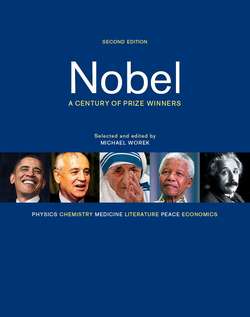Читать книгу Nobel - Michael Worek - Страница 55
На сайте Литреса книга снята с продажи.
ОглавлениеAlbert Einstein (1879–1955)
1921 Physics
For his services to theoretical physics, and especially for his discovery of the law of the photoelectric effect.
Few men today are more closely associated with genius than Albert Einstein. Born in Ulm, Germany, on March 14, 1879, his family moved to Munich. His high school years were spent in Aarau, Switzerland, when his family moved once more, this time to Italy.
Einstein entered the Swiss Federal Polytechnic School at 18 with the intention of becoming a mathematics and physics teacher and, upon completion of his studies, was made a naturalized Swiss citizen in 1901. Unable to get a job as a teacher, he went to work as a technical assistant at the Swiss Patent Office. In his free time, however, besides preparing for his doctorate degree — which he obtained in 1905 — Einstein was developing some of his most notable work, which was soon to shock the academic world.
In 1908 he was nominated to be an assistant in Berne, Switzerland, but the following year he was made an associate professor at the University of Zurich. In 1911 he took up the chair of theoretical physics at the University of Prague, and then he moved to Switzerland in 1912 to take up a similar position. Einstein returned to Germany in 1914, reacquired his citizenship, took up a chair at the University of Berlin and became head of the Kaiser Wilhelm Institute of Physics.
Einstein won the 1921 Nobel Prize in Physics for his extensive work in theoretical physics, particularly for discovering the law of photoelectric effect. He stayed in Berlin until 1933, the year in which he renounced his German citizenship for political reasons and immigrated to the United States, where he became a professor of theoretical physics at Princeton University. In 1940 he became a naturalized American citizen and retired five years later.
He abhorred all nationalism and in the postwar period became a prominent figure in the world government movement. He was invited to be president of the State of Israel, an offer he turned town, but he did collaborate with Chaim Weizmann in creating the Hebrew University of Jerusalem.
His work brought him numerous prizes besides the Nobel, including the Copley Medal of the Royal Society of London in 1925 and the Franklin Medal of the Franklin Institute a decade later. Einstein left the world a rich store of publications and manuscripts, the most significant of the scientific works being Special Theory of Relativity (1905), General Theory of Relativity (1916) and The Evolution of Physics (1938). His nonscientific works include Why War? (1933), My Philosophy (1934) and Out of My Later Years (1950).
He married twice, first in 1901 to Mileva Maritc, with whom he had a daughter and two sons, and after their divorce to his cousin Elsa Löwenthal in 1917. He was made a widower in 1936 and died 19 years later in Princeton, New Jersey.
